UK Lean Supply Chain Management and Performance Report
VerifiedAdded on 2022/12/23
|23
|4610
|77
Report
AI Summary
This report investigates the impact of lean supply chain management (LSCM) practices on organizational performance within the UK. It begins by establishing the importance of effective supply chain management in today's competitive business environment, highlighting the shift from product-focused strategies to customer-centric approaches. The report then explores the background and rationale for LSCM, emphasizing the need for agility and efficiency in the face of global competition and waste reduction. It outlines research objectives and questions, aiming to identify the supply chain management practices among UK companies, the factors affecting them, the extent of LSCM implementation, and its impact on organizational performance. A comprehensive literature review covers supply chain management, lean management, and LSCM, defining key concepts and discussing advantages. The report examines components of LSCM practices, including lean suppliers, procurement, manufacturing, transportation, warehousing, and customer relations, and discusses the competitive advantages gained through LSCM implementation. The report concludes with a conceptual framework and an overview of the research design and methodology, including the paradigm of inquiry, research methods, data collection, and ethical considerations.
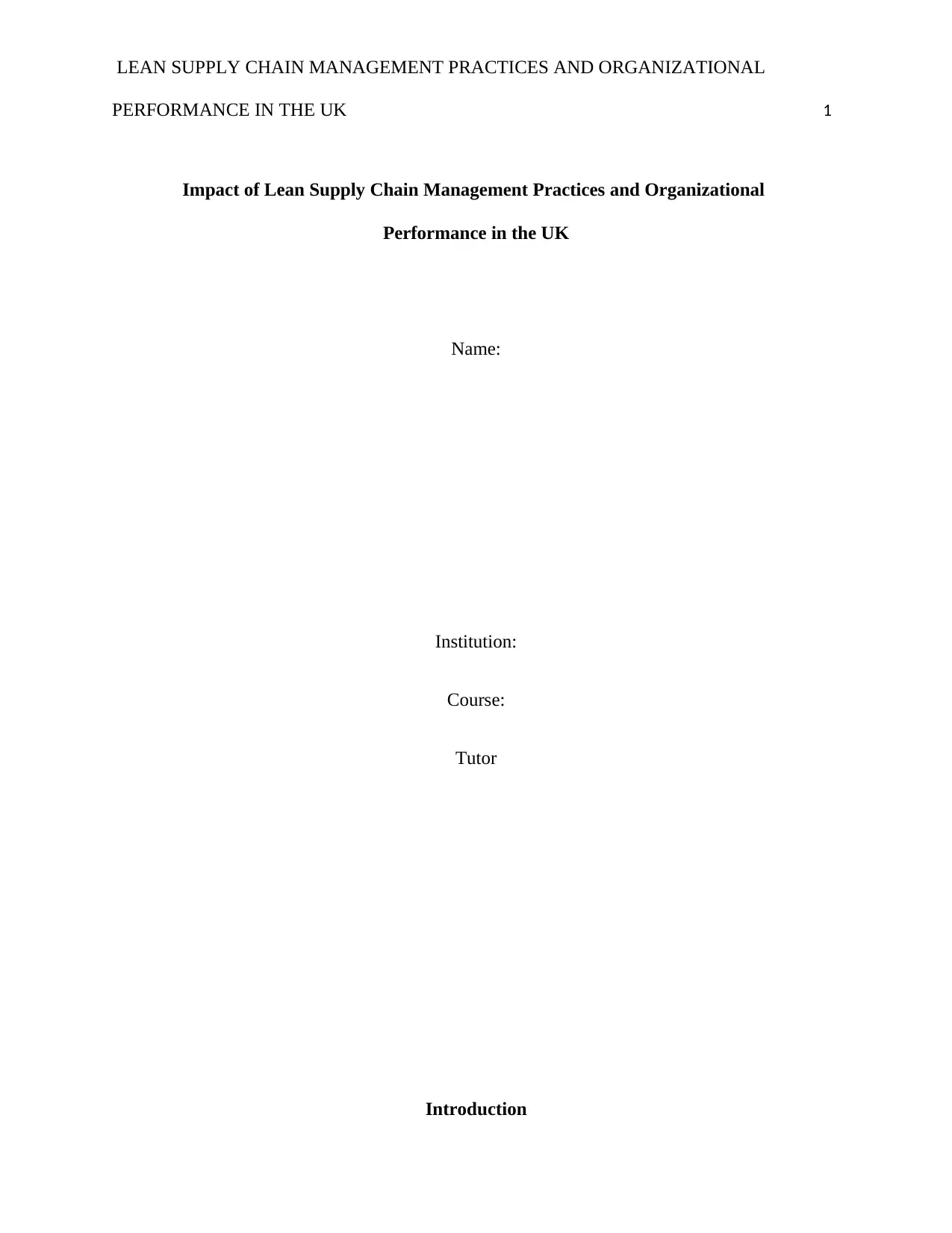
LEAN SUPPLY CHAIN MANAGEMENT PRACTICES AND ORGANIZATIONAL
PERFORMANCE IN THE UK 1
Impact of Lean Supply Chain Management Practices and Organizational
Performance in the UK
Name:
Institution:
Course:
Tutor
Introduction
PERFORMANCE IN THE UK 1
Impact of Lean Supply Chain Management Practices and Organizational
Performance in the UK
Name:
Institution:
Course:
Tutor
Introduction
Paraphrase This Document
Need a fresh take? Get an instant paraphrase of this document with our AI Paraphraser
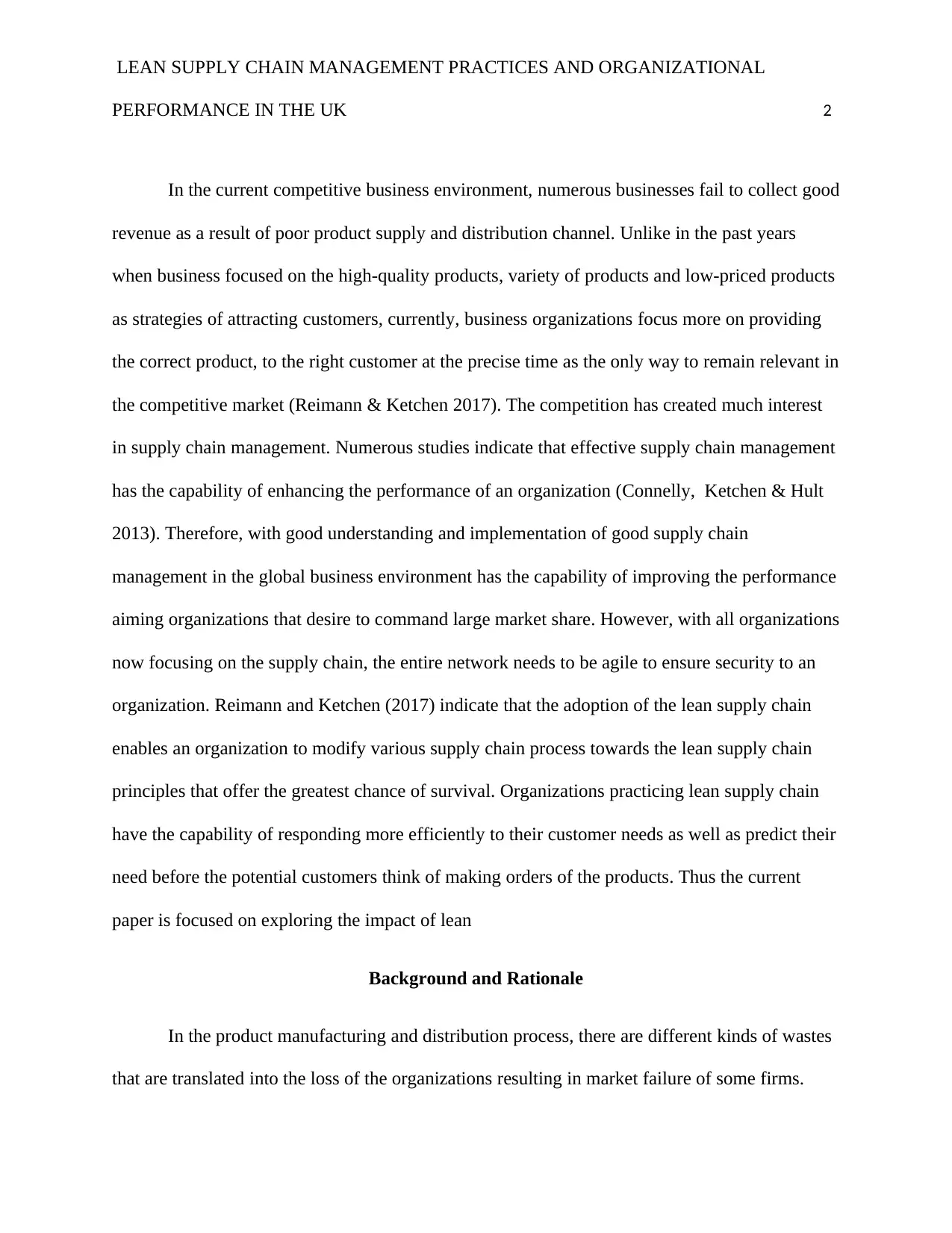
LEAN SUPPLY CHAIN MANAGEMENT PRACTICES AND ORGANIZATIONAL
PERFORMANCE IN THE UK 2
In the current competitive business environment, numerous businesses fail to collect good
revenue as a result of poor product supply and distribution channel. Unlike in the past years
when business focused on the high-quality products, variety of products and low-priced products
as strategies of attracting customers, currently, business organizations focus more on providing
the correct product, to the right customer at the precise time as the only way to remain relevant in
the competitive market (Reimann & Ketchen 2017). The competition has created much interest
in supply chain management. Numerous studies indicate that effective supply chain management
has the capability of enhancing the performance of an organization (Connelly, Ketchen & Hult
2013). Therefore, with good understanding and implementation of good supply chain
management in the global business environment has the capability of improving the performance
aiming organizations that desire to command large market share. However, with all organizations
now focusing on the supply chain, the entire network needs to be agile to ensure security to an
organization. Reimann and Ketchen (2017) indicate that the adoption of the lean supply chain
enables an organization to modify various supply chain process towards the lean supply chain
principles that offer the greatest chance of survival. Organizations practicing lean supply chain
have the capability of responding more efficiently to their customer needs as well as predict their
need before the potential customers think of making orders of the products. Thus the current
paper is focused on exploring the impact of lean
Background and Rationale
In the product manufacturing and distribution process, there are different kinds of wastes
that are translated into the loss of the organizations resulting in market failure of some firms.
PERFORMANCE IN THE UK 2
In the current competitive business environment, numerous businesses fail to collect good
revenue as a result of poor product supply and distribution channel. Unlike in the past years
when business focused on the high-quality products, variety of products and low-priced products
as strategies of attracting customers, currently, business organizations focus more on providing
the correct product, to the right customer at the precise time as the only way to remain relevant in
the competitive market (Reimann & Ketchen 2017). The competition has created much interest
in supply chain management. Numerous studies indicate that effective supply chain management
has the capability of enhancing the performance of an organization (Connelly, Ketchen & Hult
2013). Therefore, with good understanding and implementation of good supply chain
management in the global business environment has the capability of improving the performance
aiming organizations that desire to command large market share. However, with all organizations
now focusing on the supply chain, the entire network needs to be agile to ensure security to an
organization. Reimann and Ketchen (2017) indicate that the adoption of the lean supply chain
enables an organization to modify various supply chain process towards the lean supply chain
principles that offer the greatest chance of survival. Organizations practicing lean supply chain
have the capability of responding more efficiently to their customer needs as well as predict their
need before the potential customers think of making orders of the products. Thus the current
paper is focused on exploring the impact of lean
Background and Rationale
In the product manufacturing and distribution process, there are different kinds of wastes
that are translated into the loss of the organizations resulting in market failure of some firms.
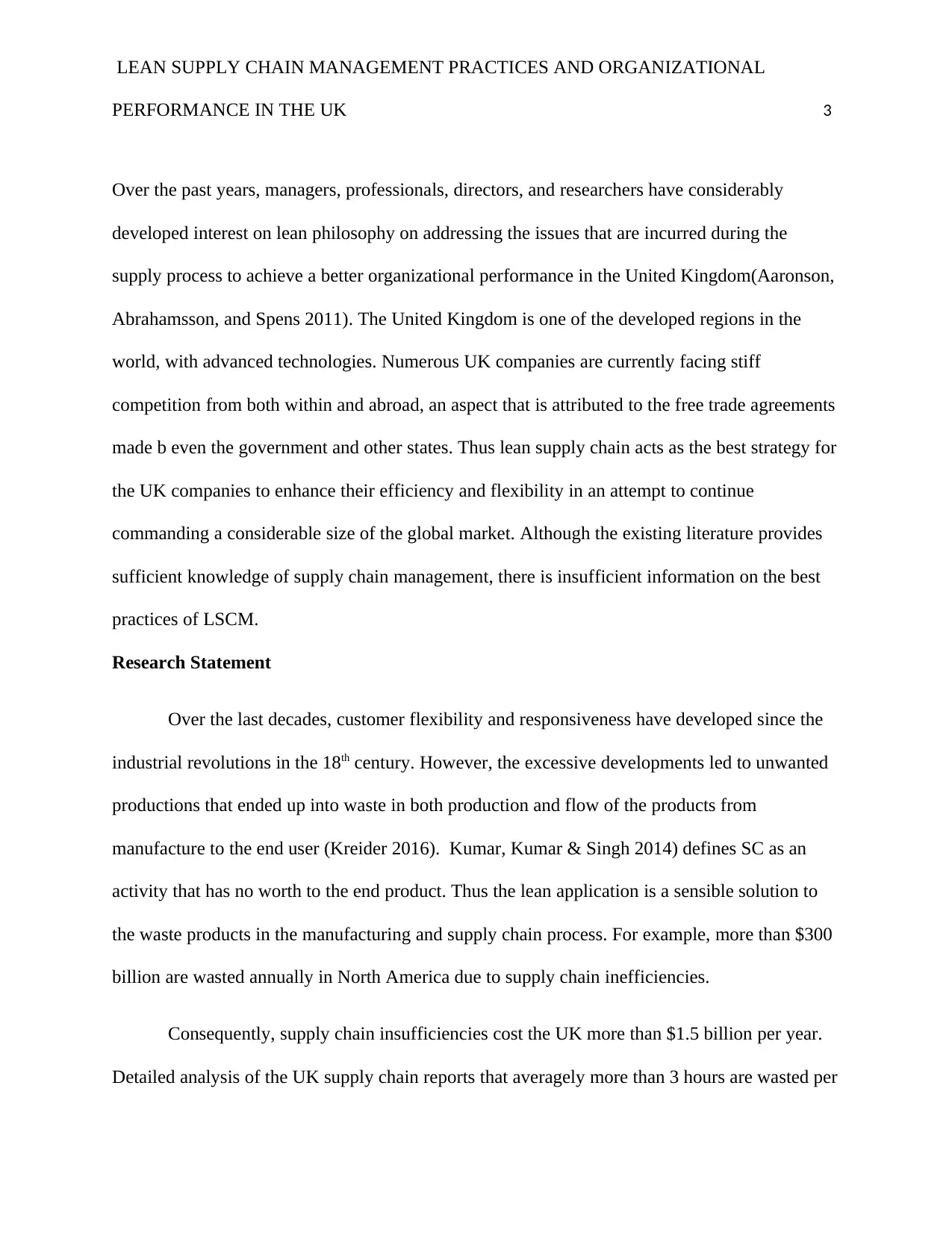
LEAN SUPPLY CHAIN MANAGEMENT PRACTICES AND ORGANIZATIONAL
PERFORMANCE IN THE UK 3
Over the past years, managers, professionals, directors, and researchers have considerably
developed interest on lean philosophy on addressing the issues that are incurred during the
supply process to achieve a better organizational performance in the United Kingdom(Aaronson,
Abrahamsson, and Spens 2011). The United Kingdom is one of the developed regions in the
world, with advanced technologies. Numerous UK companies are currently facing stiff
competition from both within and abroad, an aspect that is attributed to the free trade agreements
made b even the government and other states. Thus lean supply chain acts as the best strategy for
the UK companies to enhance their efficiency and flexibility in an attempt to continue
commanding a considerable size of the global market. Although the existing literature provides
sufficient knowledge of supply chain management, there is insufficient information on the best
practices of LSCM.
Research Statement
Over the last decades, customer flexibility and responsiveness have developed since the
industrial revolutions in the 18th century. However, the excessive developments led to unwanted
productions that ended up into waste in both production and flow of the products from
manufacture to the end user (Kreider 2016). Kumar, Kumar & Singh 2014) defines SC as an
activity that has no worth to the end product. Thus the lean application is a sensible solution to
the waste products in the manufacturing and supply chain process. For example, more than $300
billion are wasted annually in North America due to supply chain inefficiencies.
Consequently, supply chain insufficiencies cost the UK more than $1.5 billion per year.
Detailed analysis of the UK supply chain reports that averagely more than 3 hours are wasted per
PERFORMANCE IN THE UK 3
Over the past years, managers, professionals, directors, and researchers have considerably
developed interest on lean philosophy on addressing the issues that are incurred during the
supply process to achieve a better organizational performance in the United Kingdom(Aaronson,
Abrahamsson, and Spens 2011). The United Kingdom is one of the developed regions in the
world, with advanced technologies. Numerous UK companies are currently facing stiff
competition from both within and abroad, an aspect that is attributed to the free trade agreements
made b even the government and other states. Thus lean supply chain acts as the best strategy for
the UK companies to enhance their efficiency and flexibility in an attempt to continue
commanding a considerable size of the global market. Although the existing literature provides
sufficient knowledge of supply chain management, there is insufficient information on the best
practices of LSCM.
Research Statement
Over the last decades, customer flexibility and responsiveness have developed since the
industrial revolutions in the 18th century. However, the excessive developments led to unwanted
productions that ended up into waste in both production and flow of the products from
manufacture to the end user (Kreider 2016). Kumar, Kumar & Singh 2014) defines SC as an
activity that has no worth to the end product. Thus the lean application is a sensible solution to
the waste products in the manufacturing and supply chain process. For example, more than $300
billion are wasted annually in North America due to supply chain inefficiencies.
Consequently, supply chain insufficiencies cost the UK more than $1.5 billion per year.
Detailed analysis of the UK supply chain reports that averagely more than 3 hours are wasted per
⊘ This is a preview!⊘
Do you want full access?
Subscribe today to unlock all pages.

Trusted by 1+ million students worldwide
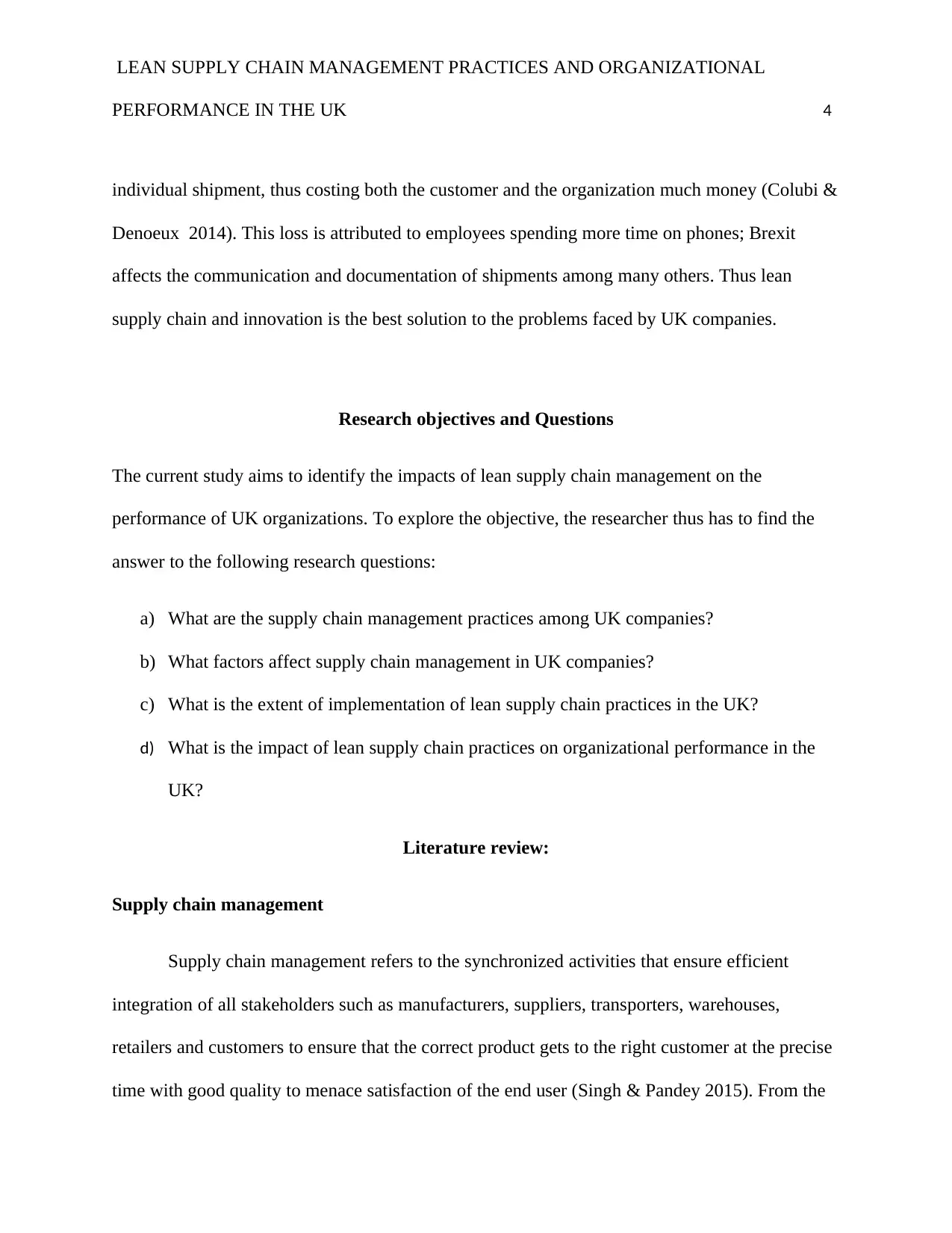
LEAN SUPPLY CHAIN MANAGEMENT PRACTICES AND ORGANIZATIONAL
PERFORMANCE IN THE UK 4
individual shipment, thus costing both the customer and the organization much money (Colubi &
Denoeux 2014). This loss is attributed to employees spending more time on phones; Brexit
affects the communication and documentation of shipments among many others. Thus lean
supply chain and innovation is the best solution to the problems faced by UK companies.
Research objectives and Questions
The current study aims to identify the impacts of lean supply chain management on the
performance of UK organizations. To explore the objective, the researcher thus has to find the
answer to the following research questions:
a) What are the supply chain management practices among UK companies?
b) What factors affect supply chain management in UK companies?
c) What is the extent of implementation of lean supply chain practices in the UK?
d) What is the impact of lean supply chain practices on organizational performance in the
UK?
Literature review:
Supply chain management
Supply chain management refers to the synchronized activities that ensure efficient
integration of all stakeholders such as manufacturers, suppliers, transporters, warehouses,
retailers and customers to ensure that the correct product gets to the right customer at the precise
time with good quality to menace satisfaction of the end user (Singh & Pandey 2015). From the
PERFORMANCE IN THE UK 4
individual shipment, thus costing both the customer and the organization much money (Colubi &
Denoeux 2014). This loss is attributed to employees spending more time on phones; Brexit
affects the communication and documentation of shipments among many others. Thus lean
supply chain and innovation is the best solution to the problems faced by UK companies.
Research objectives and Questions
The current study aims to identify the impacts of lean supply chain management on the
performance of UK organizations. To explore the objective, the researcher thus has to find the
answer to the following research questions:
a) What are the supply chain management practices among UK companies?
b) What factors affect supply chain management in UK companies?
c) What is the extent of implementation of lean supply chain practices in the UK?
d) What is the impact of lean supply chain practices on organizational performance in the
UK?
Literature review:
Supply chain management
Supply chain management refers to the synchronized activities that ensure efficient
integration of all stakeholders such as manufacturers, suppliers, transporters, warehouses,
retailers and customers to ensure that the correct product gets to the right customer at the precise
time with good quality to menace satisfaction of the end user (Singh & Pandey 2015). From the
Paraphrase This Document
Need a fresh take? Get an instant paraphrase of this document with our AI Paraphraser
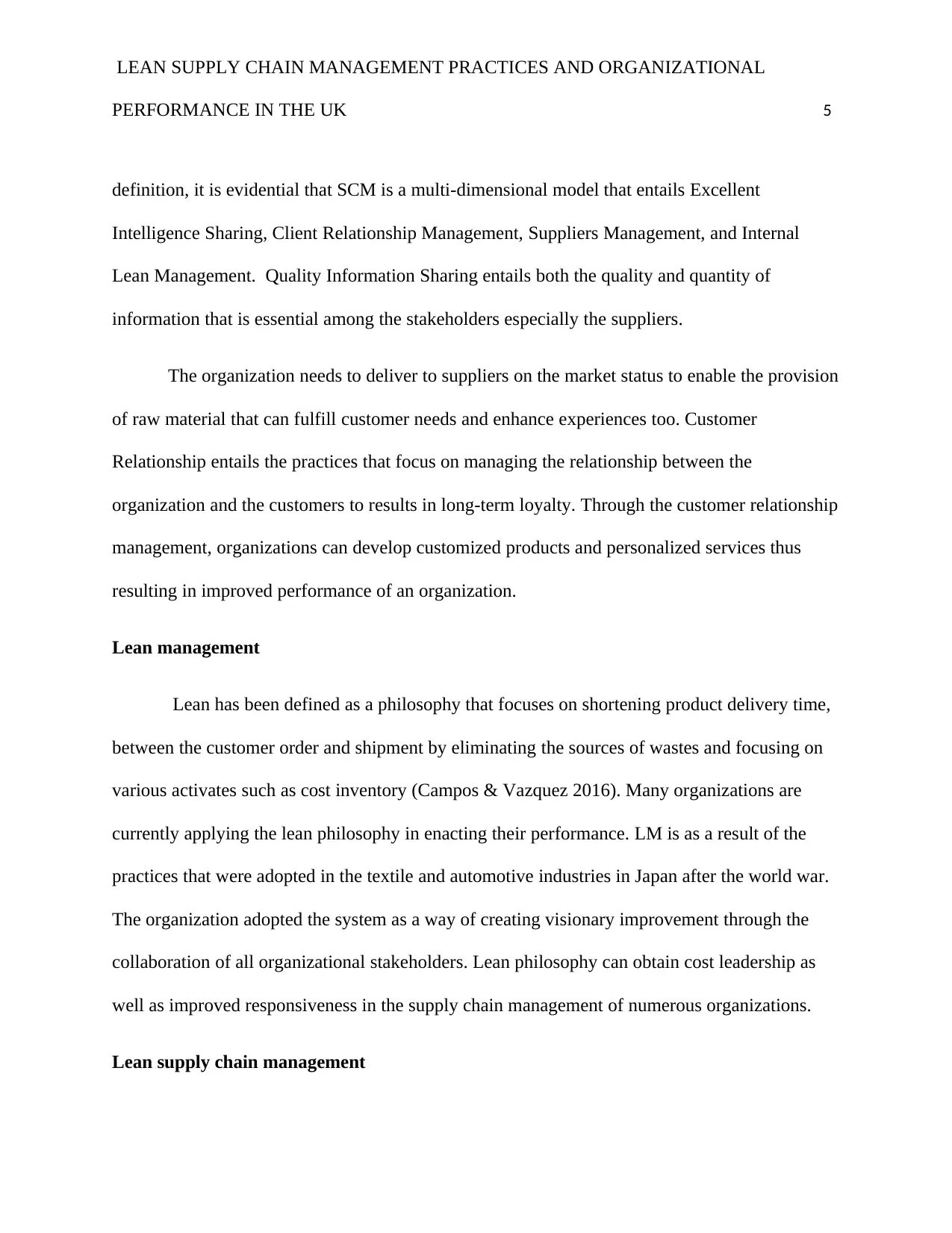
LEAN SUPPLY CHAIN MANAGEMENT PRACTICES AND ORGANIZATIONAL
PERFORMANCE IN THE UK 5
definition, it is evidential that SCM is a multi-dimensional model that entails Excellent
Intelligence Sharing, Client Relationship Management, Suppliers Management, and Internal
Lean Management. Quality Information Sharing entails both the quality and quantity of
information that is essential among the stakeholders especially the suppliers.
The organization needs to deliver to suppliers on the market status to enable the provision
of raw material that can fulfill customer needs and enhance experiences too. Customer
Relationship entails the practices that focus on managing the relationship between the
organization and the customers to results in long-term loyalty. Through the customer relationship
management, organizations can develop customized products and personalized services thus
resulting in improved performance of an organization.
Lean management
Lean has been defined as a philosophy that focuses on shortening product delivery time,
between the customer order and shipment by eliminating the sources of wastes and focusing on
various activates such as cost inventory (Campos & Vazquez 2016). Many organizations are
currently applying the lean philosophy in enacting their performance. LM is as a result of the
practices that were adopted in the textile and automotive industries in Japan after the world war.
The organization adopted the system as a way of creating visionary improvement through the
collaboration of all organizational stakeholders. Lean philosophy can obtain cost leadership as
well as improved responsiveness in the supply chain management of numerous organizations.
Lean supply chain management
PERFORMANCE IN THE UK 5
definition, it is evidential that SCM is a multi-dimensional model that entails Excellent
Intelligence Sharing, Client Relationship Management, Suppliers Management, and Internal
Lean Management. Quality Information Sharing entails both the quality and quantity of
information that is essential among the stakeholders especially the suppliers.
The organization needs to deliver to suppliers on the market status to enable the provision
of raw material that can fulfill customer needs and enhance experiences too. Customer
Relationship entails the practices that focus on managing the relationship between the
organization and the customers to results in long-term loyalty. Through the customer relationship
management, organizations can develop customized products and personalized services thus
resulting in improved performance of an organization.
Lean management
Lean has been defined as a philosophy that focuses on shortening product delivery time,
between the customer order and shipment by eliminating the sources of wastes and focusing on
various activates such as cost inventory (Campos & Vazquez 2016). Many organizations are
currently applying the lean philosophy in enacting their performance. LM is as a result of the
practices that were adopted in the textile and automotive industries in Japan after the world war.
The organization adopted the system as a way of creating visionary improvement through the
collaboration of all organizational stakeholders. Lean philosophy can obtain cost leadership as
well as improved responsiveness in the supply chain management of numerous organizations.
Lean supply chain management
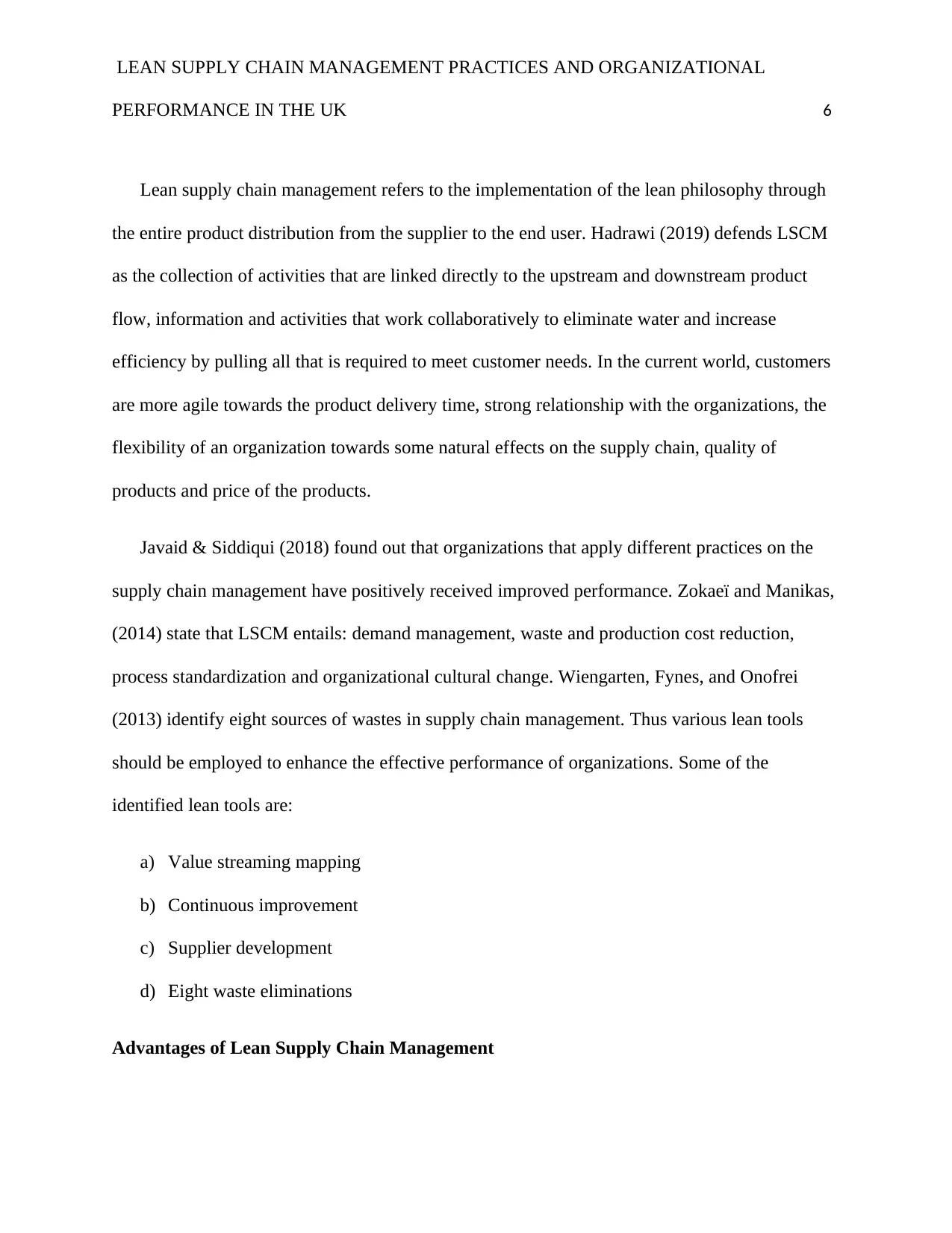
LEAN SUPPLY CHAIN MANAGEMENT PRACTICES AND ORGANIZATIONAL
PERFORMANCE IN THE UK 6
Lean supply chain management refers to the implementation of the lean philosophy through
the entire product distribution from the supplier to the end user. Hadrawi (2019) defends LSCM
as the collection of activities that are linked directly to the upstream and downstream product
flow, information and activities that work collaboratively to eliminate water and increase
efficiency by pulling all that is required to meet customer needs. In the current world, customers
are more agile towards the product delivery time, strong relationship with the organizations, the
flexibility of an organization towards some natural effects on the supply chain, quality of
products and price of the products.
Javaid & Siddiqui (2018) found out that organizations that apply different practices on the
supply chain management have positively received improved performance. Zokaeï and Manikas,
(2014) state that LSCM entails: demand management, waste and production cost reduction,
process standardization and organizational cultural change. Wiengarten, Fynes, and Onofrei
(2013) identify eight sources of wastes in supply chain management. Thus various lean tools
should be employed to enhance the effective performance of organizations. Some of the
identified lean tools are:
a) Value streaming mapping
b) Continuous improvement
c) Supplier development
d) Eight waste eliminations
Advantages of Lean Supply Chain Management
PERFORMANCE IN THE UK 6
Lean supply chain management refers to the implementation of the lean philosophy through
the entire product distribution from the supplier to the end user. Hadrawi (2019) defends LSCM
as the collection of activities that are linked directly to the upstream and downstream product
flow, information and activities that work collaboratively to eliminate water and increase
efficiency by pulling all that is required to meet customer needs. In the current world, customers
are more agile towards the product delivery time, strong relationship with the organizations, the
flexibility of an organization towards some natural effects on the supply chain, quality of
products and price of the products.
Javaid & Siddiqui (2018) found out that organizations that apply different practices on the
supply chain management have positively received improved performance. Zokaeï and Manikas,
(2014) state that LSCM entails: demand management, waste and production cost reduction,
process standardization and organizational cultural change. Wiengarten, Fynes, and Onofrei
(2013) identify eight sources of wastes in supply chain management. Thus various lean tools
should be employed to enhance the effective performance of organizations. Some of the
identified lean tools are:
a) Value streaming mapping
b) Continuous improvement
c) Supplier development
d) Eight waste eliminations
Advantages of Lean Supply Chain Management
⊘ This is a preview!⊘
Do you want full access?
Subscribe today to unlock all pages.

Trusted by 1+ million students worldwide
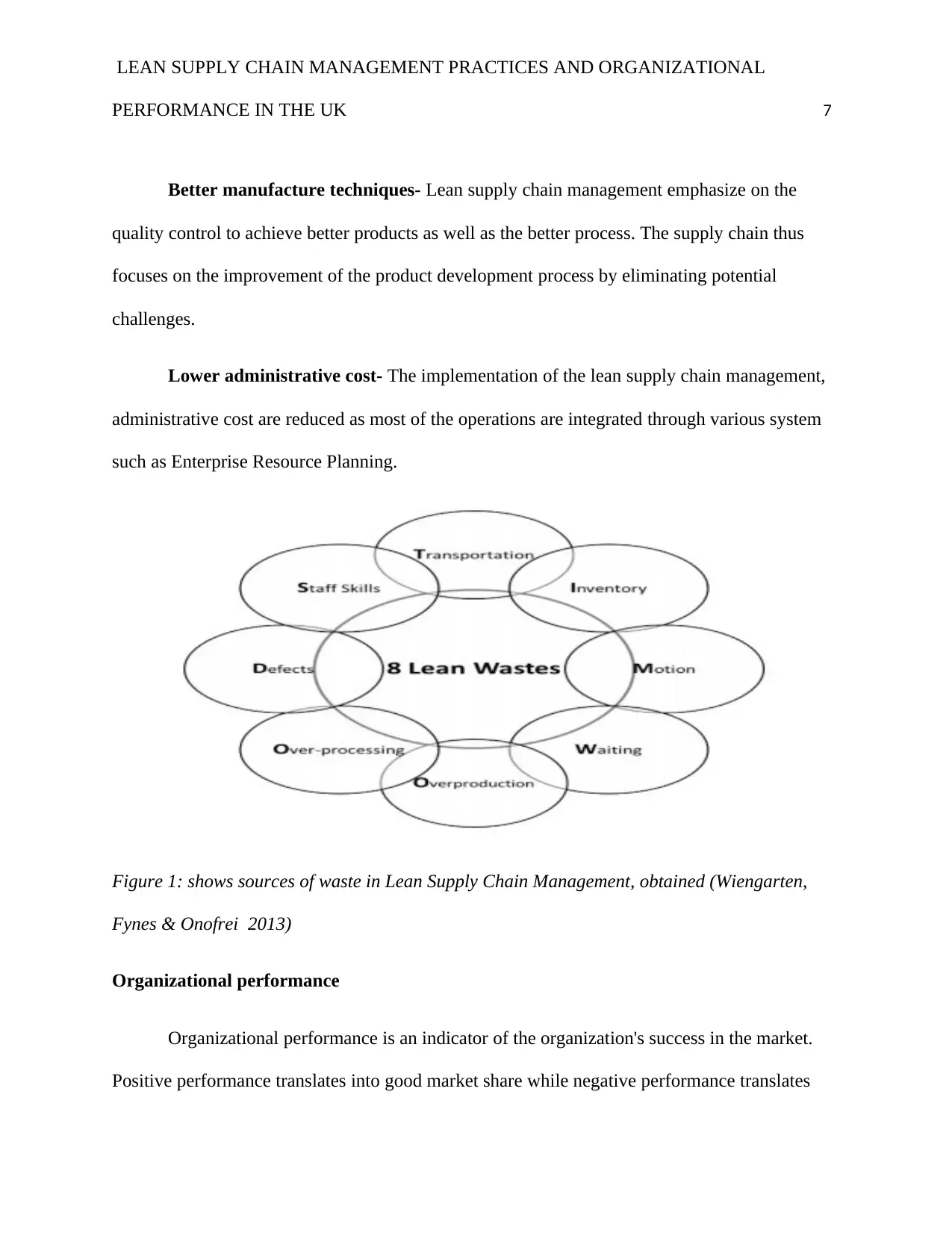
LEAN SUPPLY CHAIN MANAGEMENT PRACTICES AND ORGANIZATIONAL
PERFORMANCE IN THE UK 7
Better manufacture techniques- Lean supply chain management emphasize on the
quality control to achieve better products as well as the better process. The supply chain thus
focuses on the improvement of the product development process by eliminating potential
challenges.
Lower administrative cost- The implementation of the lean supply chain management,
administrative cost are reduced as most of the operations are integrated through various system
such as Enterprise Resource Planning.
Figure 1: shows sources of waste in Lean Supply Chain Management, obtained (Wiengarten,
Fynes & Onofrei 2013)
Organizational performance
Organizational performance is an indicator of the organization's success in the market.
Positive performance translates into good market share while negative performance translates
PERFORMANCE IN THE UK 7
Better manufacture techniques- Lean supply chain management emphasize on the
quality control to achieve better products as well as the better process. The supply chain thus
focuses on the improvement of the product development process by eliminating potential
challenges.
Lower administrative cost- The implementation of the lean supply chain management,
administrative cost are reduced as most of the operations are integrated through various system
such as Enterprise Resource Planning.
Figure 1: shows sources of waste in Lean Supply Chain Management, obtained (Wiengarten,
Fynes & Onofrei 2013)
Organizational performance
Organizational performance is an indicator of the organization's success in the market.
Positive performance translates into good market share while negative performance translates
Paraphrase This Document
Need a fresh take? Get an instant paraphrase of this document with our AI Paraphraser
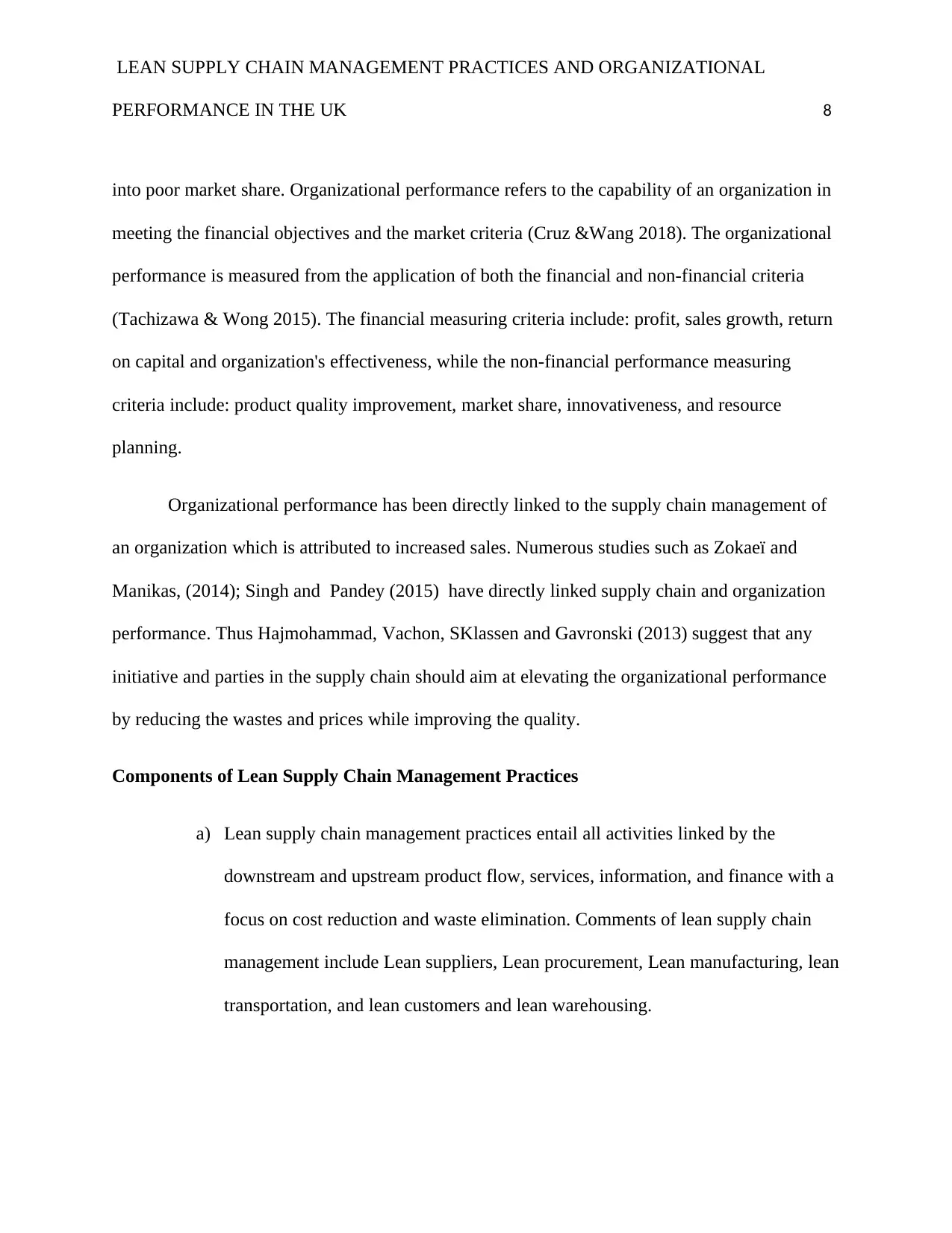
LEAN SUPPLY CHAIN MANAGEMENT PRACTICES AND ORGANIZATIONAL
PERFORMANCE IN THE UK 8
into poor market share. Organizational performance refers to the capability of an organization in
meeting the financial objectives and the market criteria (Cruz &Wang 2018). The organizational
performance is measured from the application of both the financial and non-financial criteria
(Tachizawa & Wong 2015). The financial measuring criteria include: profit, sales growth, return
on capital and organization's effectiveness, while the non-financial performance measuring
criteria include: product quality improvement, market share, innovativeness, and resource
planning.
Organizational performance has been directly linked to the supply chain management of
an organization which is attributed to increased sales. Numerous studies such as Zokaeï and
Manikas, (2014); Singh and Pandey (2015) have directly linked supply chain and organization
performance. Thus Hajmohammad, Vachon, SKlassen and Gavronski (2013) suggest that any
initiative and parties in the supply chain should aim at elevating the organizational performance
by reducing the wastes and prices while improving the quality.
Components of Lean Supply Chain Management Practices
a) Lean supply chain management practices entail all activities linked by the
downstream and upstream product flow, services, information, and finance with a
focus on cost reduction and waste elimination. Comments of lean supply chain
management include Lean suppliers, Lean procurement, Lean manufacturing, lean
transportation, and lean customers and lean warehousing.
PERFORMANCE IN THE UK 8
into poor market share. Organizational performance refers to the capability of an organization in
meeting the financial objectives and the market criteria (Cruz &Wang 2018). The organizational
performance is measured from the application of both the financial and non-financial criteria
(Tachizawa & Wong 2015). The financial measuring criteria include: profit, sales growth, return
on capital and organization's effectiveness, while the non-financial performance measuring
criteria include: product quality improvement, market share, innovativeness, and resource
planning.
Organizational performance has been directly linked to the supply chain management of
an organization which is attributed to increased sales. Numerous studies such as Zokaeï and
Manikas, (2014); Singh and Pandey (2015) have directly linked supply chain and organization
performance. Thus Hajmohammad, Vachon, SKlassen and Gavronski (2013) suggest that any
initiative and parties in the supply chain should aim at elevating the organizational performance
by reducing the wastes and prices while improving the quality.
Components of Lean Supply Chain Management Practices
a) Lean supply chain management practices entail all activities linked by the
downstream and upstream product flow, services, information, and finance with a
focus on cost reduction and waste elimination. Comments of lean supply chain
management include Lean suppliers, Lean procurement, Lean manufacturing, lean
transportation, and lean customers and lean warehousing.
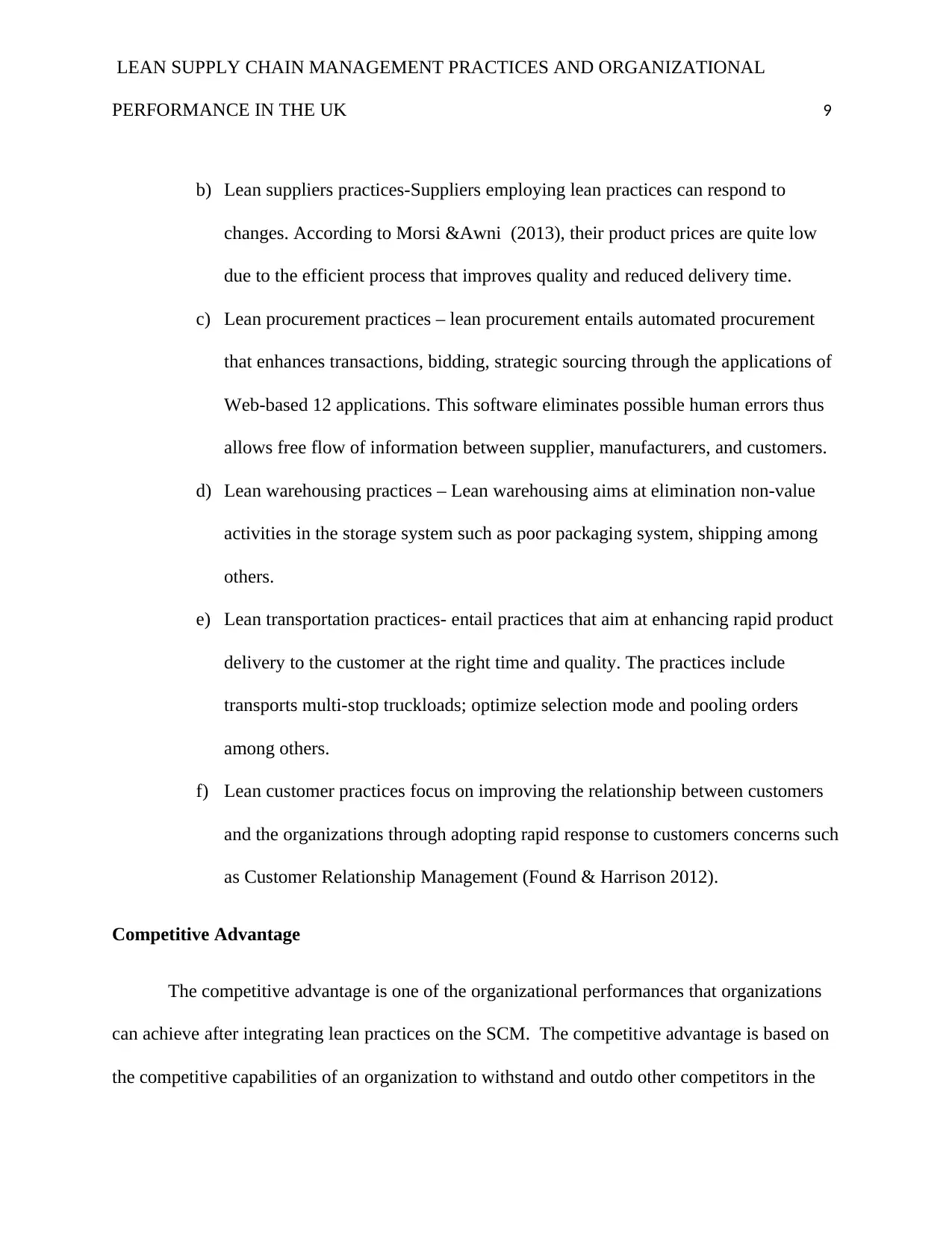
LEAN SUPPLY CHAIN MANAGEMENT PRACTICES AND ORGANIZATIONAL
PERFORMANCE IN THE UK 9
b) Lean suppliers practices-Suppliers employing lean practices can respond to
changes. According to Morsi &Awni (2013), their product prices are quite low
due to the efficient process that improves quality and reduced delivery time.
c) Lean procurement practices – lean procurement entails automated procurement
that enhances transactions, bidding, strategic sourcing through the applications of
Web-based 12 applications. This software eliminates possible human errors thus
allows free flow of information between supplier, manufacturers, and customers.
d) Lean warehousing practices – Lean warehousing aims at elimination non-value
activities in the storage system such as poor packaging system, shipping among
others.
e) Lean transportation practices- entail practices that aim at enhancing rapid product
delivery to the customer at the right time and quality. The practices include
transports multi-stop truckloads; optimize selection mode and pooling orders
among others.
f) Lean customer practices focus on improving the relationship between customers
and the organizations through adopting rapid response to customers concerns such
as Customer Relationship Management (Found & Harrison 2012).
Competitive Advantage
The competitive advantage is one of the organizational performances that organizations
can achieve after integrating lean practices on the SCM. The competitive advantage is based on
the competitive capabilities of an organization to withstand and outdo other competitors in the
PERFORMANCE IN THE UK 9
b) Lean suppliers practices-Suppliers employing lean practices can respond to
changes. According to Morsi &Awni (2013), their product prices are quite low
due to the efficient process that improves quality and reduced delivery time.
c) Lean procurement practices – lean procurement entails automated procurement
that enhances transactions, bidding, strategic sourcing through the applications of
Web-based 12 applications. This software eliminates possible human errors thus
allows free flow of information between supplier, manufacturers, and customers.
d) Lean warehousing practices – Lean warehousing aims at elimination non-value
activities in the storage system such as poor packaging system, shipping among
others.
e) Lean transportation practices- entail practices that aim at enhancing rapid product
delivery to the customer at the right time and quality. The practices include
transports multi-stop truckloads; optimize selection mode and pooling orders
among others.
f) Lean customer practices focus on improving the relationship between customers
and the organizations through adopting rapid response to customers concerns such
as Customer Relationship Management (Found & Harrison 2012).
Competitive Advantage
The competitive advantage is one of the organizational performances that organizations
can achieve after integrating lean practices on the SCM. The competitive advantage is based on
the competitive capabilities of an organization to withstand and outdo other competitors in the
⊘ This is a preview!⊘
Do you want full access?
Subscribe today to unlock all pages.

Trusted by 1+ million students worldwide
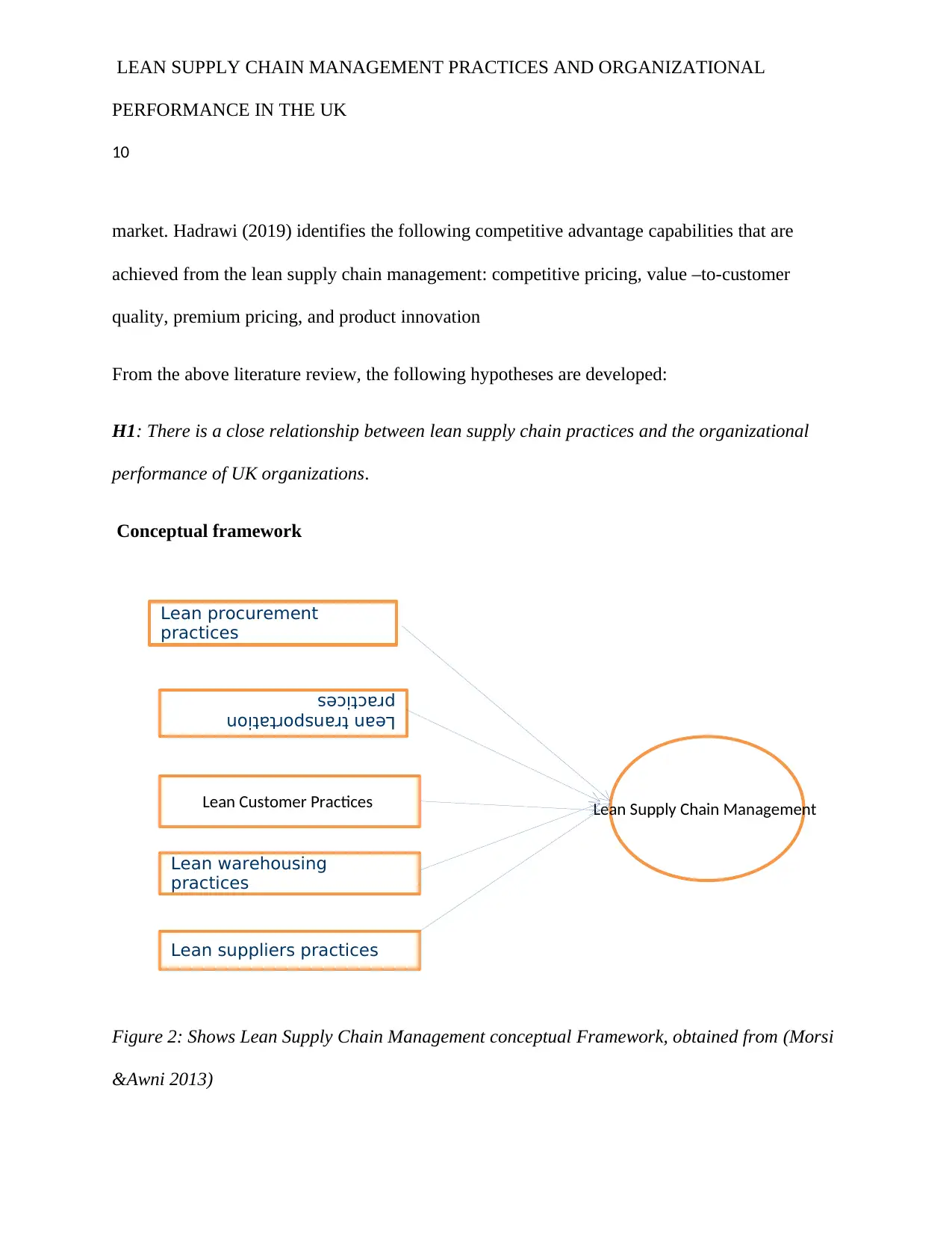
Lean transportation
practices
Lean procurement
practices
Lean warehousing
practices
Lean suppliers practices
Lean Supply Chain ManagementLean Customer Practices
LEAN SUPPLY CHAIN MANAGEMENT PRACTICES AND ORGANIZATIONAL
PERFORMANCE IN THE UK
10
market. Hadrawi (2019) identifies the following competitive advantage capabilities that are
achieved from the lean supply chain management: competitive pricing, value –to-customer
quality, premium pricing, and product innovation
From the above literature review, the following hypotheses are developed:
H1: There is a close relationship between lean supply chain practices and the organizational
performance of UK organizations.
Conceptual framework
Figure 2: Shows Lean Supply Chain Management conceptual Framework, obtained from (Morsi
&Awni 2013)
practices
Lean procurement
practices
Lean warehousing
practices
Lean suppliers practices
Lean Supply Chain ManagementLean Customer Practices
LEAN SUPPLY CHAIN MANAGEMENT PRACTICES AND ORGANIZATIONAL
PERFORMANCE IN THE UK
10
market. Hadrawi (2019) identifies the following competitive advantage capabilities that are
achieved from the lean supply chain management: competitive pricing, value –to-customer
quality, premium pricing, and product innovation
From the above literature review, the following hypotheses are developed:
H1: There is a close relationship between lean supply chain practices and the organizational
performance of UK organizations.
Conceptual framework
Figure 2: Shows Lean Supply Chain Management conceptual Framework, obtained from (Morsi
&Awni 2013)
Paraphrase This Document
Need a fresh take? Get an instant paraphrase of this document with our AI Paraphraser
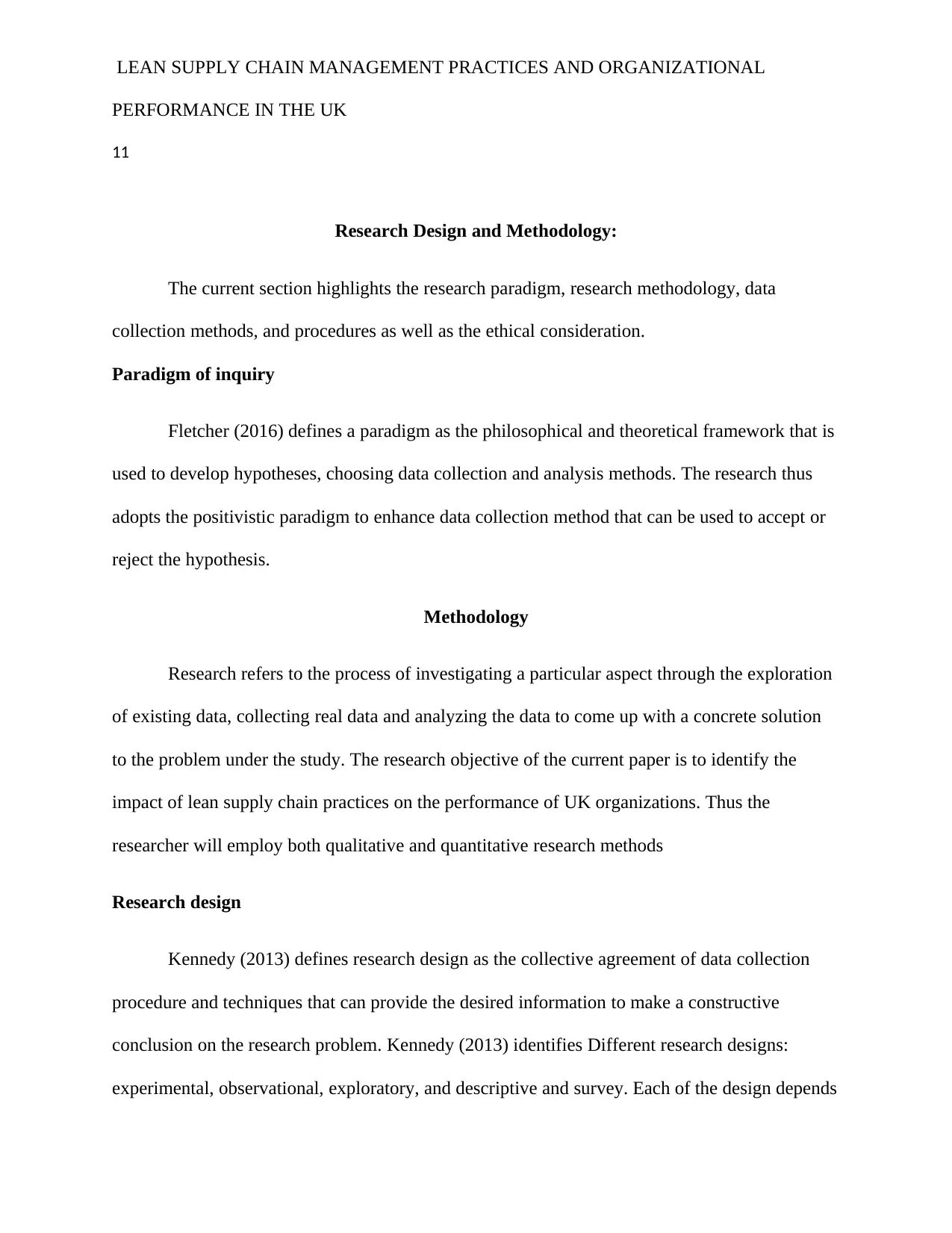
LEAN SUPPLY CHAIN MANAGEMENT PRACTICES AND ORGANIZATIONAL
PERFORMANCE IN THE UK
11
Research Design and Methodology:
The current section highlights the research paradigm, research methodology, data
collection methods, and procedures as well as the ethical consideration.
Paradigm of inquiry
Fletcher (2016) defines a paradigm as the philosophical and theoretical framework that is
used to develop hypotheses, choosing data collection and analysis methods. The research thus
adopts the positivistic paradigm to enhance data collection method that can be used to accept or
reject the hypothesis.
Methodology
Research refers to the process of investigating a particular aspect through the exploration
of existing data, collecting real data and analyzing the data to come up with a concrete solution
to the problem under the study. The research objective of the current paper is to identify the
impact of lean supply chain practices on the performance of UK organizations. Thus the
researcher will employ both qualitative and quantitative research methods
Research design
Kennedy (2013) defines research design as the collective agreement of data collection
procedure and techniques that can provide the desired information to make a constructive
conclusion on the research problem. Kennedy (2013) identifies Different research designs:
experimental, observational, exploratory, and descriptive and survey. Each of the design depends
PERFORMANCE IN THE UK
11
Research Design and Methodology:
The current section highlights the research paradigm, research methodology, data
collection methods, and procedures as well as the ethical consideration.
Paradigm of inquiry
Fletcher (2016) defines a paradigm as the philosophical and theoretical framework that is
used to develop hypotheses, choosing data collection and analysis methods. The research thus
adopts the positivistic paradigm to enhance data collection method that can be used to accept or
reject the hypothesis.
Methodology
Research refers to the process of investigating a particular aspect through the exploration
of existing data, collecting real data and analyzing the data to come up with a concrete solution
to the problem under the study. The research objective of the current paper is to identify the
impact of lean supply chain practices on the performance of UK organizations. Thus the
researcher will employ both qualitative and quantitative research methods
Research design
Kennedy (2013) defines research design as the collective agreement of data collection
procedure and techniques that can provide the desired information to make a constructive
conclusion on the research problem. Kennedy (2013) identifies Different research designs:
experimental, observational, exploratory, and descriptive and survey. Each of the design depends
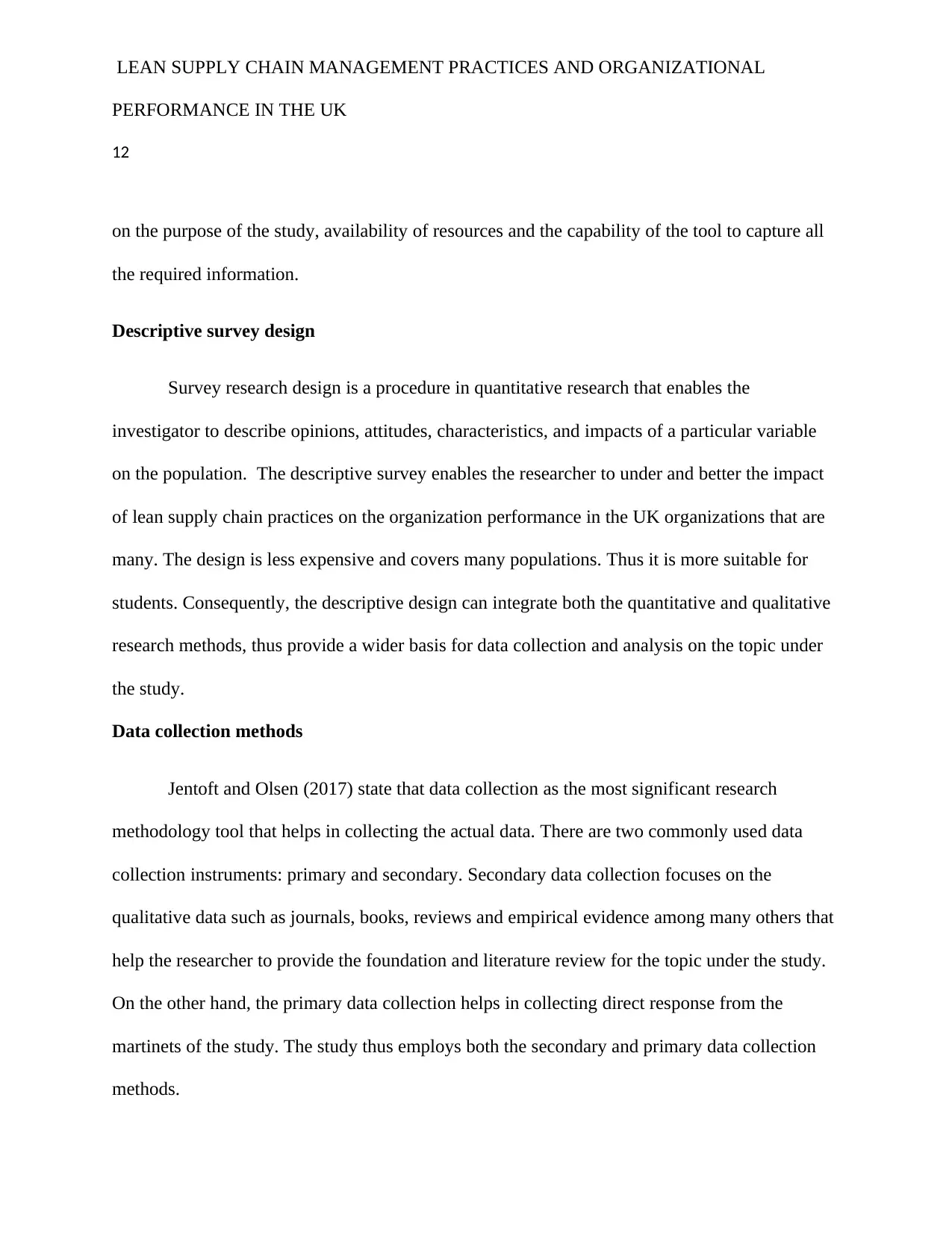
LEAN SUPPLY CHAIN MANAGEMENT PRACTICES AND ORGANIZATIONAL
PERFORMANCE IN THE UK
12
on the purpose of the study, availability of resources and the capability of the tool to capture all
the required information.
Descriptive survey design
Survey research design is a procedure in quantitative research that enables the
investigator to describe opinions, attitudes, characteristics, and impacts of a particular variable
on the population. The descriptive survey enables the researcher to under and better the impact
of lean supply chain practices on the organization performance in the UK organizations that are
many. The design is less expensive and covers many populations. Thus it is more suitable for
students. Consequently, the descriptive design can integrate both the quantitative and qualitative
research methods, thus provide a wider basis for data collection and analysis on the topic under
the study.
Data collection methods
Jentoft and Olsen (2017) state that data collection as the most significant research
methodology tool that helps in collecting the actual data. There are two commonly used data
collection instruments: primary and secondary. Secondary data collection focuses on the
qualitative data such as journals, books, reviews and empirical evidence among many others that
help the researcher to provide the foundation and literature review for the topic under the study.
On the other hand, the primary data collection helps in collecting direct response from the
martinets of the study. The study thus employs both the secondary and primary data collection
methods.
PERFORMANCE IN THE UK
12
on the purpose of the study, availability of resources and the capability of the tool to capture all
the required information.
Descriptive survey design
Survey research design is a procedure in quantitative research that enables the
investigator to describe opinions, attitudes, characteristics, and impacts of a particular variable
on the population. The descriptive survey enables the researcher to under and better the impact
of lean supply chain practices on the organization performance in the UK organizations that are
many. The design is less expensive and covers many populations. Thus it is more suitable for
students. Consequently, the descriptive design can integrate both the quantitative and qualitative
research methods, thus provide a wider basis for data collection and analysis on the topic under
the study.
Data collection methods
Jentoft and Olsen (2017) state that data collection as the most significant research
methodology tool that helps in collecting the actual data. There are two commonly used data
collection instruments: primary and secondary. Secondary data collection focuses on the
qualitative data such as journals, books, reviews and empirical evidence among many others that
help the researcher to provide the foundation and literature review for the topic under the study.
On the other hand, the primary data collection helps in collecting direct response from the
martinets of the study. The study thus employs both the secondary and primary data collection
methods.
⊘ This is a preview!⊘
Do you want full access?
Subscribe today to unlock all pages.

Trusted by 1+ million students worldwide
1 out of 23
Related Documents
Your All-in-One AI-Powered Toolkit for Academic Success.
+13062052269
info@desklib.com
Available 24*7 on WhatsApp / Email
![[object Object]](/_next/static/media/star-bottom.7253800d.svg)
Unlock your academic potential
Copyright © 2020–2026 A2Z Services. All Rights Reserved. Developed and managed by ZUCOL.





